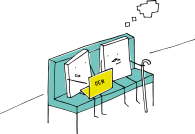Spielerisch in die Zukunft – Offene Lehrmethoden finden auch an Hochschulen immer mehr Anwendung

<<GERMAN>> In Zeiten des ständigen Wandels und der Weiterentwicklung ist es essenziell, sich an die neuen Möglichkeiten, auch in der Lehre, anzupassen. Seit geraumer Zeit entwickeln sich die Unterrichtsmethoden an Universitäten und Hochschulen hin zu offenen Lehrmethoden. Um die Lehrkräfte in dieser Umstrukturierung bestmöglich unterstützen zu können, wird an der DHBW Karlsruhe im Rahmen des Open Game Project (Promoting Open Education through Gamification) nun ein Spiel für Computer und Smartphones entwickelt werden, durch das die Lehrenden auf Basis von realen Anwendungsfällen offene Lehrmethoden ausprobieren können und direktes Feedback zu ihren Entscheidungen erhalten. Lehrende lernen spielerisch, wie sie den offenen Lehransatz in ihren Veranstaltungen effektiv und problemlos einbringen können.

„Die aktuelle Coronakrise bestätigt die Notwendigkeit zur Weiterentwicklung der Lehrmethoden – und zum Wandel vom Lehren zum Lernen. In online Vorlesungen wird oft nur wenig Aktivität der Studierenden gefordert. Offene Lehrmethoden können helfen, den Studienbetrieb, besonders jetzt, effektiv und lehrreich zu gestalten“, so Prof. Dr. Ulf-Daniel Ehlers, der das Projekt an der Arbeitsgruppe NextEducation für Digitale Transformation von Bildungsprozessen der DHBW Karlsruhe leitet.
Das Bewusstsein von Hochschullehrenden für die Möglichkeiten von Offener Bildungspraxis soll gefördert werden.
Das Projekt wird von der EU mit etwa einer halben Million Euro co-finanziert. Folgende Ergebnisse werden in den zwei Jahren Laufzeit erarbeitet:
1 – In einem Handbuch sollen die verschiedenen Möglichkeiten an offenen Lehrmethoden dargestellt und erläutert werden. Den Lehrkräften wird hier eine Übersicht der Kompetenzen gegeben, die für offene Lehrmethoden notwendig sind.
Zudem wird ein beispielhafter Lehrplan für einen Kurs über Offene Bildungspraktiken erstellt.
2 – Um den Lehrkräften die Kompetenzerweiterung zu erleichtern, soll das entwickelte Online-Lernspiel als Hilfestellung dienen. Getestet wird es mithilfe von 300 Pädagogen an sechs verschiedenen Universitäten.
3 – Zuletzt sollen insgesamt fünf Outreach-Workshops (in Madrid, Nantes, Lissabon, Karlsruhe und Dublin) veranstaltet werden, bei denen die Ergebnisse der Spielleistungen besprochen und beworben werden sollen. Die Pädagogen, die im Spiel am besten abschnitten, werden dazu eingeladen, ihre Erfahrungen zu teilen, um auch andere Interessierte für offene Lehrmethoden zu begeistern.
Sechs Hochschulen aus Deutschland, Frankreich, Irland, Portugal und Spanien arbeiten gemeinsam in Kooperation mit dem Open Education Consortium und dem International Council for Open and Distance Education (ICDE) an dem Projekt, das von Erasmus+ finanziert wird.
Es läuft seit Januar 2019 bis einschließlich September 2021.
Für weitere Informationen kontaktieren Sie uns gerne unter Silke.huber@dhbw-karlsruhe.de.

Open Game: A playful way into the future – Open teaching methods find an increasing application at universities
<<ENGLISH>> In times of constant change and development, it is essential to keep up with the latest opportunities, not least in teaching. For some time the teaching methods at universities and colleges have been moving towards open teaching methods. In order to support the teaching staff in this reorganization as much as possible, the Open Game Project (Promoting Open Education through Gamification) develops a game for computers and smartphones that will allow teachers to try out open teaching methods based on real-life applications and receive direct feedback on their decisions. In this way, teachers will learn playfully how to apply the open teaching methods effectively and easily in their classes.
„The current corona crisis shows the importance of further development of digital teaching/ learning methods. When just substituting our face-to-face lectures with online video-streams there is often little student activity required. Especially now, open teaching methods can help to make studying effective and more instructive,“ explains Prof. Dr. Ulf-Daniel Ehlers, who leads the project at the NextEdcuation working group for Digital Transformation of educational processes at the DHBW Karlsruhe.
The idea is to raise the awareness of university teachers for the possibilities of OEP by integrating successful „teacher-centered“ practices into their lessons and by offering them an opportunity to try out open teaching methods in a safe test environment through playful activities. Accordingly, teachers can widen their competence to work with open learning methods.
The project is co-finance by the European Union with about half a million Euro. The following results are expected during the two-year duration:
1 – A guidebook will present and explain the different possibilities of open teaching techniques. Teachers will be given an overview of the competences required for using them.
2 – In addition, an exemplary curriculum for a course on open educational practices will be developed.
3 – In order to make it easier for the teachers to expand their competences, the developed game will serve as an aid. It will be tested with the support of 300 educators at six separate universities.
Finally, a total of five Outreach Workshops (in Madrid, Nantes, Lisbon, Karlsruhe and Dublin) will be held to discuss and promote the results of the game. The educators who scored best in the game will be invited to share their experiences in order to inspire other interested teachers to use open teaching methods.
Six universities from Germany, France, Ireland, Portugal and Spain are involved in the project as well as the Open Education Consortium and the International Council for Open and Distance Education (ICDE). The project runs since October 2019 to September 2021.
For further information please contact us at Silke.huber@dhbw-karlsruhe.de.
